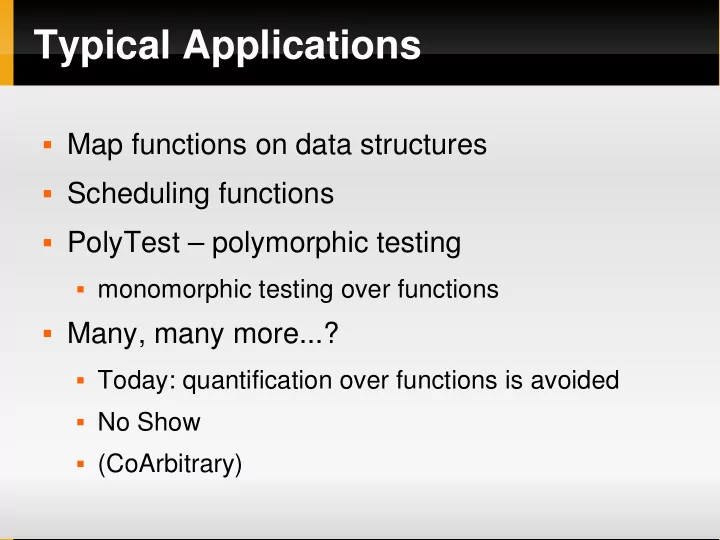

Typical Applications Map functions on data structures Scheduling functions PolyTest – polymorphic testing monomorphic testing over functions Many, many more...? Today: quantification over functions is avoided No Show (CoArbitrary)
Observations Key insight: functions are infinite objects ... ... but are only applied to a finite number of arguments in any terminating computation
“Solution” #0 - unsafePerformIO dirty trick... -- creating “magic” functions makeMagicFun :: (a->b) -> IO (IORef [(a,b)], a->b) -- function modifier data Fun a b = Fun (IORef [(a,b)]) (a->b) ...that does not even work well!
Function Types concrete representation of partial functions shrink build a -> b a :-> b apply table [(a,b)] show String
Types of Functions -- creating concrete functions class Argument a where build :: (a -> b) -> (a :-> b) -- applying concrete functions apply :: (a :-> b) -> b -> (a -> b) -- looking at concrete functions table :: (a :-> b) -> [(a,b)] the only way of -- shrinking concrete functions creating a partial shrink :: (a :-> b) -> [a :-> b] function
Implementing Concrete Functions data a :-> c where -- holy trinity Unit :: c -> (():->c) Pair :: (a:->(b:->c)) -> ((a,b):->c) (:+:) :: (a:->c) -> (b:->c) -> (Either a b:->c) -- all other argument types Map :: (a->b) -> (b->a) -> (b:->c) -> (a:->c) -- for partial functions Nil :: (a:->c) instance Functor (a:->)
Tabulating Concrete Functions reason for specific type () table :: (a :-> c) -> [(a,c)] table (Unit c) = [ ((),c) ] table (Pair p) = [ ((x,y),c) | (x,q)<-table p , (y,c)<-table q ] table (p :+: q) = [ (Left x,c) | (x,c)<-table p ] ++ [ (Right y,c) | (y,c)<-table q ] table Nil = [] table (Map _ h p) = [ (h x,c) | (x,c)<-table p ] result is often infinite...
Building Concrete Functions class Argument a where build :: (a->b) -> (a:->b) instance Argument () where build f = Unit (f ()) instance (Argument a, Argument b) => Argument (a,b) where build f = Pair (fmap build (build (curry f))) instance (Argument a, Argument b) => Argument (Either a b) where build f = build (f . Left) :+: build (f . Right)
Building Concrete Functions buildMap :: Argument b => (a->b) -> (b->a) -> (a->c) -> (a:->c) buildMap g h f = Map g h (build (f . h)) -- instance for lists instance Argument a => Argument [a] where build = buildMap g h where ...and Bool, g [] = Left () Integer, Int, g (x:xs) = Right (x,xs) Char, Maybe, ... h (Left _) = [] h (Right (x,xs)) = x:xs
Applying Concrete Functions apply :: (a :-> c) -> c -> (a -> c) apply (Unit c) _ () = c apply (Pair p) d (x,y) = apply (fmap (\q -> apply q d y) p) d x apply (p :+: q) d exy = either (apply p d) (apply q d) exy apply Nil d _ = d apply (Map g _ p) d x = apply p d (g x) -- providing a default argument func :: (a :-> c) -> (a -> c) func cf = apply cf (snd (head (table cf)))
Shrinking Concrete Functions shrink' :: (c -> [c]) -> (a :-> c) -> [a :-> c] shrink' shr (Pair p) = [Pair p' | p' <- shrink' (\q -> shrink' shr q) p] shrink' shr (p :+: q) = [p :+: Nil | not (isNil q)] ++ [Nil :+: q | not (isNil p)] ++ [p' :+: q | p' <- shrink' shr p ] ++ [p :+: q' | q' <- shrink' shr q ] shrink' shr (Unit c) = [ Nil ] ++ [ Unit c' | c' <- shr c ]
Shrinking Concrete Functions shrink' :: (c -> [c]) -> (a :-> c) -> [a :-> c] ... shrink' shr Nil = [] shrink' shr (Map g h p) = [ Map g h p' | p' <- shrink' shr p ]
Fun Modifier do not show before shrinking! data Fun a b = Fun (a:->b) (a->b) instance (Show a, Show b) => Show (Fun a b) -- uses show on (a:->b) instance (CoArbitrary a, Arbitrary b) => Arbitrary (Fun a b) -- uses arbitrary on (a->b) -- uses shrink on (a:->b)
(demo)
Extensions more efficient shrinking methods data a :-> c where ... -- finite tables Table :: Eq a => [(a,c)] -> (a:->c) -- higher-order functions Function :: [a] -> ([b]:->c) -> ((a:->b):->c) only works for concrete second-order function; need to functions... be able to “show”
Conclusions Modifiers are a useful idiom Shrinking & showing at the same time Higher-order functions? Related: Concrete algorithms, generalized tries
Recommend
More recommend